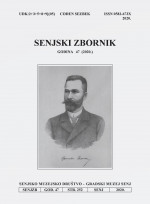OD PLZENJSKOG PIVA DO DVOŘÁKA: ČEŠKI MOTIVI U ROMANIMA VJENCESLAVA NOVAKA
FROM PILSNER BEER TO DVOŘÁK: CZECH MOTIFS IN THE NOVELS OF VJENCESLAV NOVAK
Author(s): Marijan LipovacSubject(s): Croatian Literature
Published by: Senjsko muzejsko društvo i Gradski muzej Senj
Keywords: Croatian-Czech relations; Czech Republic; Prague; Dvořák; beer;
Summary/Abstract: Vjenceslav Novak’s links with the Czech Republic were multiple, and the most important was his Czech origin via his father who settled in Senj from Hradec Králové. The Czech origin is also visible in his name, which was originally Václav and which is the Czech form of the name Vjenceslav. Another important link between Novak and the Czech Republic is the fact that from 1884 to 1887 he studied at the Conservatory in Prague, which obviously had an influence on his creativity because the plot of two of Novak’s novels, Pavao Šegota (1888) and Dva svijeta (Two Worlds) (1901) take places partially in Prague. In the novel, Pavao Šegota Novak depicted the life of a young talented village man, Pavao Šegota who goes to Prague to study natural sciences and there he marries Pražanka Lora. In doing so, Novak introduces the motif of a love affair between Croatian students in Prague with the local girls into Croatian literary. A frequent motif of the novel is the Czech beer that contributes to the good mood between the Croatian students but also causes arguments. In this novel, Novak also gives us descriptions of Prague, especially the parts long the River Vltava. // In the novel Dva svijeta the main character is Amadej Zlatanić, a musical genius from a small Croatian town whose talent is discovered by a local Czech musician Jan Jahoda. Thanks to him, Amadej goes to the Conservatory in Prague. With this Novak is probably the first in Croatian literature to write about the Czech musicians who settled in Croatia, and he also mentions the events of 1848 in the Czech Republic. The most valuable documentary part of the novel is the description of the premiere of the oratorio Stabat Mater of Antonín Dvořák, which the composer directed himself. Both novels were translated into Czech the language – Pavao Šegota in 1925, under the title Svět volá – moře čeká (Svijet zove – more čeka), and Dva svijeta in 2015.
Journal: Senjski zbornik - prilozi za geografiju, etnologiju, gospodarstvo, povijest i kulturu
- Issue Year: 47/2020
- Issue No: 1
- Page Range: 209-218
- Page Count: 10
- Language: Croatian

